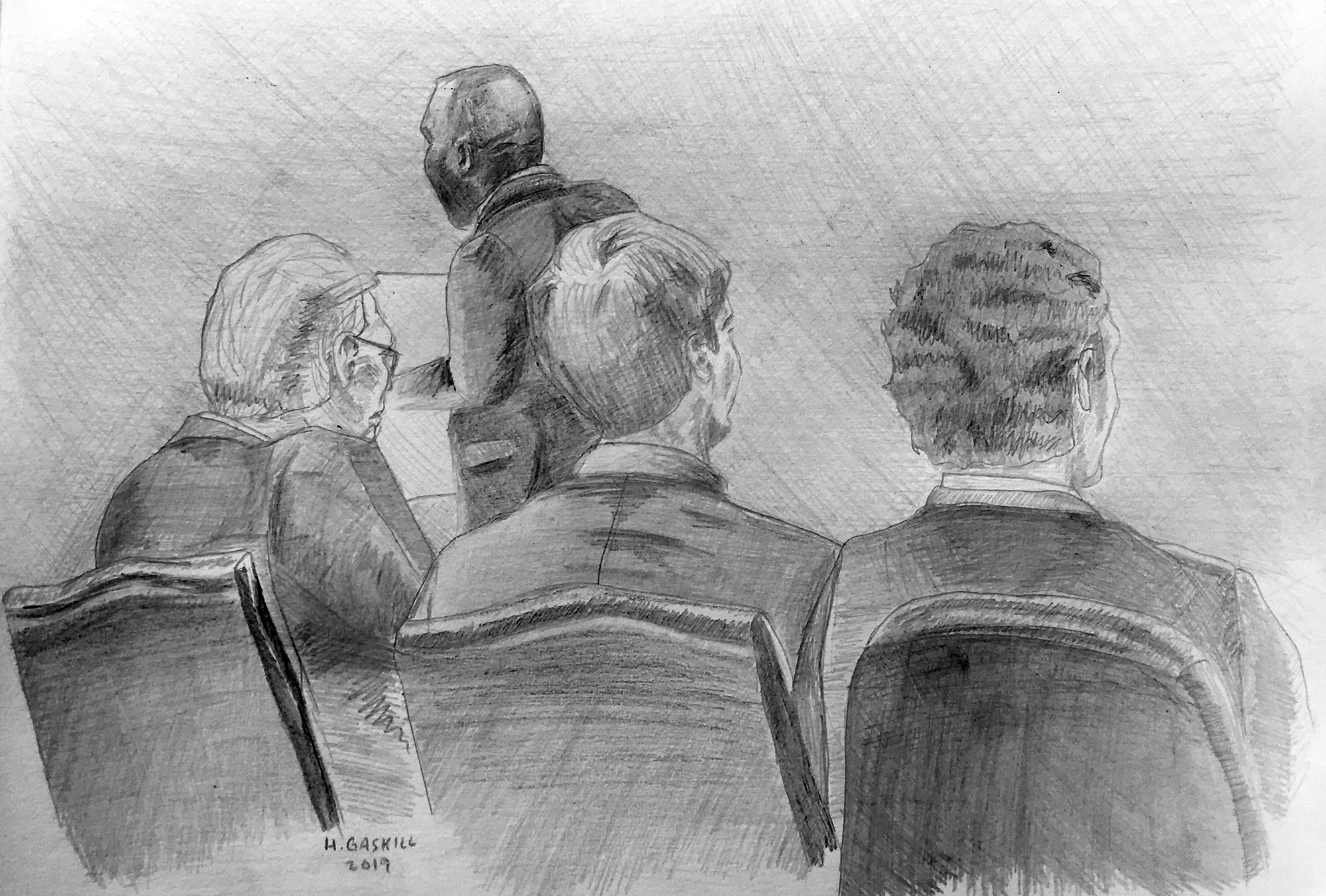Christine Condon and Jillian Atelsek
Senior staff writers
Jurors heard two starkly different accounts of Sean Urbanski on the first day of testimony in his murder trial Wednesday — two years, six months and 21 days after prosecutors say he fatally stabbed a black man on the University of Maryland’s campus.
To the prosecution, Urbanski was a man filled with hatred, with “poison” he ingested from racist imagery he saw online. And with his inhibitions lowered from alcohol, he prepared himself to act on that hatred, said assistant state’s attorney Jason Abbott.
“When he was drinking,” Abbott said, “he was pouring gasoline on a fire.”
As portrayed by the defense, though, Urbanski was “extraordinarily” drunk and frustrated, perhaps that his friends were graduating, while he was not, because he had missed a semester. And the racist images found on his cell phone were among numerous photos sent in a GroupMe chat, only a handful of which were offensive, they said.
“The real tragedy,” said defense attorney William Brennan, was that “the state has attempted to sell a false narrative that this case is based on race.”
“They have used race to divide this community,” he told the jury.
Urbanski is charged with murder and a hate crime in the death of 2nd Lt. Richard Collins, a Bowie State University student who was days away from graduating when he was killed.
Prosecutors are seeking a conviction on hate crime and first-degree murder charges — which could carry a life sentence.
[Read more: Jury chosen for Sean Urbanski murder trial]
Urbanski’s attorneys didn’t contend that it wasn’t him who had committed the killing. His indictment also includes charges of second-degree murder.
“Identification is not an issue in this case,” said Brennan. “Whodunit is not an issue in this case.”
The courtroom was packed for the first day of testimony in his trial. At one point, Judge Lawrence Hill requested that attendees refrain from wearing clothing that depicted symbols or statements relevant to the case. Several people could be seen wearing “Justice 4 Richard Collins” T-shirts, and buttons saying “Love Not Hate.”
Prosecutors maintained that Urbanski had sufficient time to plan out his actions, and that they were based squarely on Collins’ race. Premeditation can be a brief process, Abbott told the jury during opening statements.
Surveillance video showed that after talking with someone near the Montgomery Hall bus stop for a few minutes, Urbanski left the frame. Little more than a minute later, he returned, this time wielding a folding pocket knife, as he walked up to Collins.
“The blade was already out,” Abbott said. “That’s premeditated.”
Urbanski passed by the two others Collins was standing with, an Asian woman and a white man.
Prosecutors said they’d point to the racist images found on Urbanski’s cell phone to prove he targeted Collins “for no reason other than he was a black man.” Abbott referenced two of the memes, both of which used the n-word, and one of which referenced throwing black people into a woodchipper.
But Urbanski’s attorneys argued the killing was neither premeditated nor based on Collins’ race.
There is no evidence that Urbanski uttered a slur prior to, during or after Collins’ killing, or that he viewed any of the racist images in his phone that night, Brennan said, adding that calling the killing a hate crime was based on “pure, unadulterated guesswork.”
“There’s no manifesto, there’s no speech,” Brennan said.
[Read more: “Only the beginning”: Richard Collins’ family and friends are working to cement his legacy]
The defense asserted that Urbanski was far too intoxicated to plan the killing, in what emerged as a cornerstone of their case. As police cars and emergency vehicles crowded around him on the night of the killing, attorneys said Urbanski sat calmly at the Montgomery Hall bus stop, where officers approached him.
And during their cross examination of Cpl. Garfield Kelly, the University of Maryland Police detective in charge of the case, Urbanski’s defense attorneys pointed out that after Urbanski was arrested and placed in a jail cell, cameras captured him singing, talking to himself and urinating into a drain.
Plus, despite being read his Miranda rights, defense attorney John McKenna emphasized, Urbanski spoke freely with police and handed over his cell phone without a warrant.
A blood test administered on Urbanski at about 11 a.m. on May 20, 2017 — roughly eight hours after the killing — indicated he had a blood alcohol level of .10, above the legal limit of .08.
Prosecutors, though, highlighted police body camera footage from Michael Thomas, then a police officer at University Police, that depicted portions of Urbanski’s arrest. During the video, Urbanski was speaking clearly and able to walk without assistance, Thomas said. He followed orders from Thomas, although he expressed several times that he did not understand what was happening.
“I have no idea what’s going on right now,” Urbanski could be heard saying in the video.
“Is this arrest for a robbery, a shooting, or what, sir?” he asked an officer later.
Urbanski’s attorneys also argued that their client could have been frustrated for other reasons, including that his friends were celebrating their upcoming graduation, while he was not. When his friends went to celebrate by jumping into the fountain on McKeldin Mall that night, “Sean was kind of left behind,” Brennan said.
At the beginning of the day, McKenna and Brennan attempted to exclude certain body camera footage from the night of the killing that they believed was too graphic. Hill shot that motion down.
“Due to the nature of this case, there’s just no way to wholly remove all emotions,” he said.
Testimony is set to continue Monday morning.
CORRECTION: Due to a reporting error, a previous version of this story incorrectly stated that Jonathon Church gave opening arguments for the state. It was Jason Abbott. This story has been updated.



